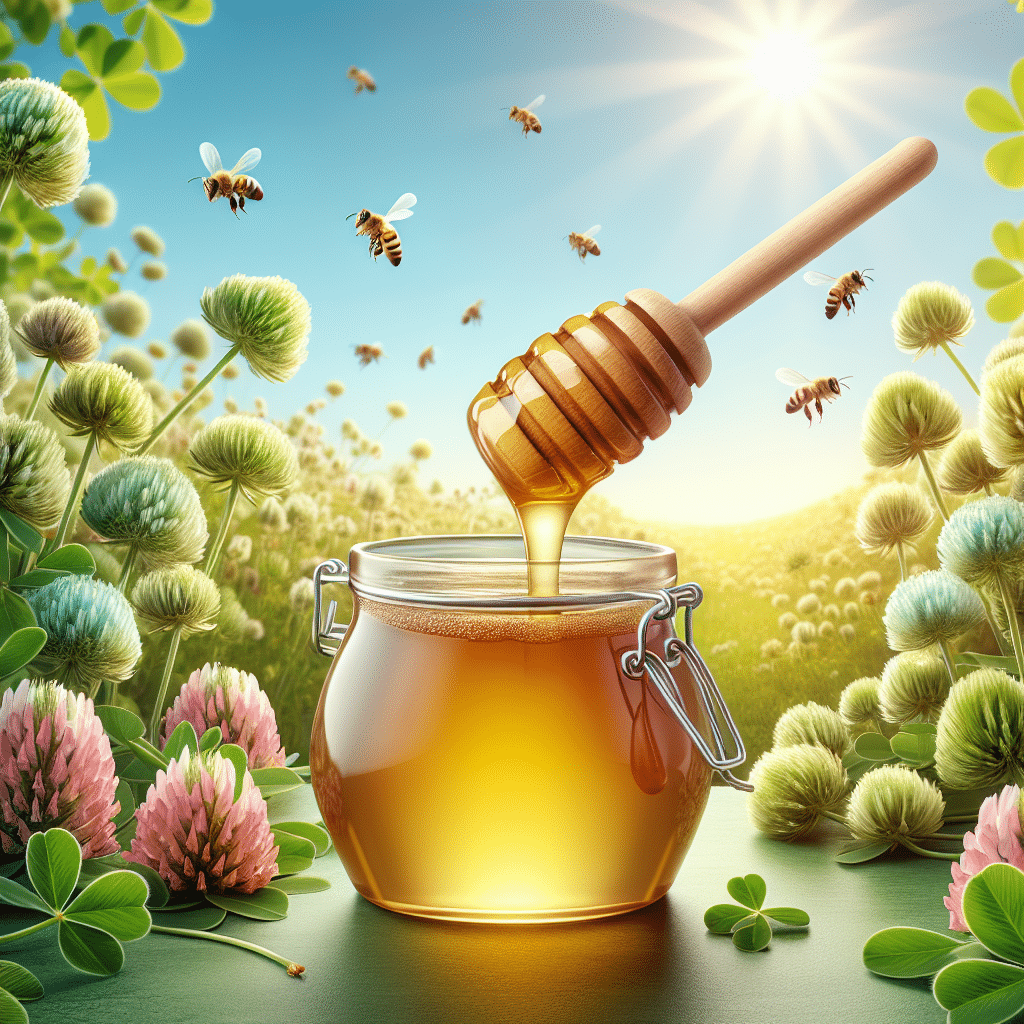Introduction to Clover Honey
Clover honey is a delectable and widely beloved variety of honey derived from the nectar of clover flowers, primarily those in the Trifolium genus. The distinct flavor profile of clover honey is typically light and mild, with floral undertones that make it a favorite among honey enthusiasts. This golden liquid is not only prized for its taste but also for its numerous health benefits. Rich in antioxidants and beneficial nutrients, clover honey has been linked to various health improvements, including enhanced immunity and digestive support. Its versatility allows it to be used in cooking, baking, or as a natural sweetener in beverages, making it a staple in households across the United States. Whether drizzled over a warm biscuit or stirred into tea, clover honey offers a touch of sweetness that pleases the palate and nourishes the body.
Understanding Clover Honey
What is Clover Honey?
Clover honey is a natural sweetener produced by honeybees from the nectar of clover blossoms. The most common clover varieties that bees forage include white clover (Trifolium repens) and red clover (Trifolium pratense). Renowned for its light color and mild sweetness, clover honey is one of the most popular types of honey available, particularly in the United States.
Characteristics of Clover Honey
Clover honey is characterized by several distinguishing features:
- Color: Typically light amber to almost colorless.
- Flavor: Mild, sweet taste with subtle floral notes.
- Aroma: Delicate and pleasant, reminiscent of fresh clover fields.
- Texture: Smooth and fluid, with a fine crystallization when it solidifies.
Production and Harvesting of Clover Honey
The Beekeeping Process
Honey production begins with beekeepers cultivating healthy bee colonies. During the clover flowering season, typically in late spring to early summer, bees collect nectar from the flowers. This nectar contains natural sugars, primarily fructose and glucose, which serve as the primary building blocks for honey.
Nectar to Honey Transformation
Once the nectar is collected, it undergoes a transformation within the bee’s body. Bees add enzymes, which break down sucrose into simpler sugars, and then deposit the nectar into hexagonal beeswax cells. The bees fan their wings to increase air circulation, reducing the nectar’s water content. This process allows the nectar to thicken and transform into honey. Once ready, the honey is capped with beeswax, indicating its maturity for harvesting.
Health Benefits of Clover Honey
Clover honey is rich in antioxidants, such as phenolic compounds and flavonoids, which are known for their anti-inflammatory and immune-boosting properties. Some of the notable health benefits include:
- Antioxidant Properties: Helps combat oxidative stress in the body.
- Anti-inflammatory Effects: May reduce inflammation and alleviate symptoms of chronic illnesses.
- Wound Healing: Has been used as a natural treatment for minor wounds and burns due to its antibacterial properties.
- Cough Relief: A traditional remedy for soothing sore throats and coughs.
Uses of Clover Honey
Clover honey’s mild flavor makes it exceptionally versatile. It can be used in many culinary applications:
- Sweetening Agent: Perfect for coffee, tea, smoothies, and baking.
- Condiment: A delightful drizzle over yogurt, oatmeal, or fresh fruit.
- Salad Dressing: Provides a natural sweetness in vinaigrettes.
- Marinades and Sauces: Enhances flavor in various dishes, including proteins and vegetables.
Purchasing and Storing Clover Honey
How to Choose Quality Clover Honey
When selecting clover honey, consider the following tips:
- Look for raw or minimally processed honey to preserve its natural nutrients.
- Check for transparency in labeling; pure clover honey should be free from additives.
- Consider local honey producers for freshness and supporting local agriculture.
Storage Recommendations
To maintain its quality, clover honey should be stored in a cool, dry place in a tightly sealed container. Avoid exposure to direct sunlight and high humidity, as both can degrade honey’s quality over time.
Frequently Asked Questions (FAQ)
Is clover honey safer than regular sugar?
Yes, clover honey contains beneficial nutrients and antioxidants, making it a healthier alternative to regular sugar. However, moderation is key, as it is still high in calories.
Can clover honey be used in baking?
Absolutely! Clover honey can be substituted for regular sugar in baking recipes. Simply use about 3/4 cup of honey for every cup of sugar and reduce other liquids in the recipe accordingly.
Does clover honey have any allergy benefits?
While there is anecdotal evidence suggesting local honey, including clover honey, may help with allergies, scientific support is limited. It’s believed that exposure to local pollens may provide some immunity over time.
How can I tell if my clover honey has gone bad?
Clover honey does not spoil; however, it may crystallize over time. If this occurs, gently warm the jar in hot water to re-liquefy the honey. Discard honey if there’s a sour smell or significant changes in flavor.
Can clover honey be used for skin care?
Yes, clover honey can be used in DIY skincare due to its moisturizing and antibacterial properties. It can be applied directly to minor cuts or mixed in face masks for hydration.
Conclusion
Clover honey is more than just a sweetener; it holds a wealth of benefits and versatility that makes it a valuable addition to your diet. With its unique flavor, health properties, and uses in various recipes, clover honey is undoubtedly a staple that enhances both culinary delights and overall health. Whether you’re a culinary enthusiast or simply aiming for a healthier lifestyle, incorporating clover honey into your daily routine can provide nourishment and sweet satisfaction.

